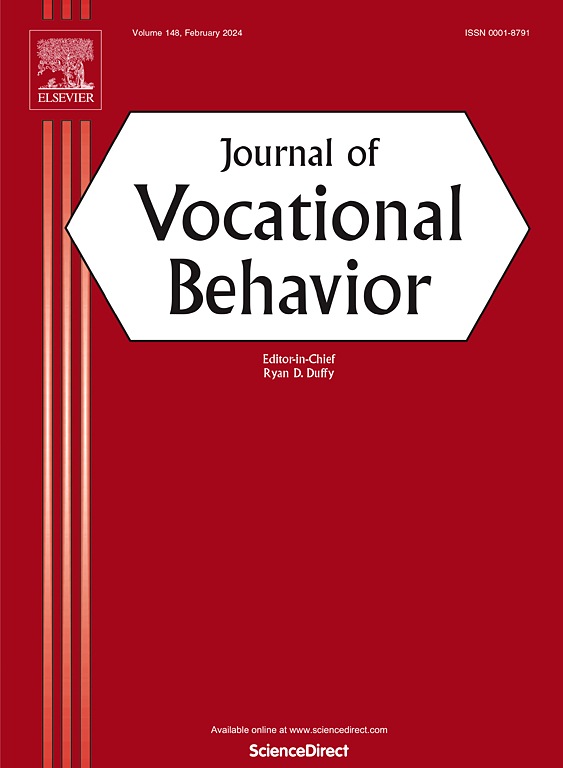The wheel is turning (and you can't slow down): Financial hardships as gendered experiences and financial insecurity trajectories
IF 5.2
1区 心理学
Q1 PSYCHOLOGY, APPLIED
引用次数: 0
Abstract
We propose that Conservation of Resources theory can be applied through a gendered lens to understand how individual and socio-structural forces explain experiences of workers' financial hardships over a six-month period (N = 455). Using latent growth curve analysis, we analyzed how energy resources (income), personal resources (money management skills), gender, and the community's gender inequality predicted workers' financial insecurity during a financial hardship. We also analyzed how the change trajectories of financial insecurity related to change trajectories in their health, work-family balance, and job attitudes over time. Results demonstrated that one's income, money management skills, and gender predicted the initial perceptions of financial insecurity. Furthermore, participants living in communities with greater gender inequality in earnings and full-time employment had higher initial levels of financial insecurity than individuals living in communities with greater gender equality. Finally, changes in financial insecurity levels predicted changes in worker health, work-family balance, and job attitudes over time. This work provides a test of Corollary 1 and Corollary 2 of Conservation of Resources theory, advancing the theory to specifically integrate gender at both individual and community levels.
车轮正在转动(你不能放慢脚步):经济困难作为性别经历和金融不安全的轨迹
我们提出,资源保护理论可以通过性别视角来理解个人和社会结构力量如何解释工人在六个月内的经济困难经历(N = 455)。利用潜在增长曲线分析,我们分析了能源资源(收入)、个人资源(资金管理技能)、性别和社区性别不平等如何预测工人在财务困难期间的财务不安全感。我们还分析了随着时间的推移,财务不安全感的变化轨迹与他们的健康、工作家庭平衡和工作态度的变化轨迹之间的关系。结果表明,一个人的收入、资金管理技能和性别预测了最初的财务不安全感。此外,生活在收入和全职工作性别不平等更大的社区的参与者比生活在性别更平等社区的人有更高的初始财务不安全感。最后,随着时间的推移,财务不安全感水平的变化预示着员工健康、工作家庭平衡和工作态度的变化。本研究对资源保护理论的推论1和推论2进行了检验,推动了该理论在个人和社区层面上具体整合性别。
本文章由计算机程序翻译,如有差异,请以英文原文为准。
求助全文
约1分钟内获得全文
求助全文
来源期刊

Journal of Vocational Behavior
PSYCHOLOGY, APPLIED-
CiteScore
13.10
自引率
5.40%
发文量
85
期刊介绍:
The Journal of Vocational Behavior publishes original empirical and theoretical articles offering unique insights into the realms of career choice, career development, and work adjustment across the lifespan. These contributions are not only valuable for academic exploration but also find applications in counseling and career development programs across diverse sectors such as colleges, universities, business, industry, government, and the military.
The primary focus of the journal centers on individual decision-making regarding work and careers, prioritizing investigations into personal career choices rather than organizational or employer-level variables. Example topics encompass a broad range, from initial career choices (e.g., choice of major, initial work or organization selection, organizational attraction) to the development of a career, work transitions, work-family management, and attitudes within the workplace (such as work commitment, multiple role management, and turnover).
 求助内容:
求助内容: 应助结果提醒方式:
应助结果提醒方式:


